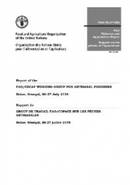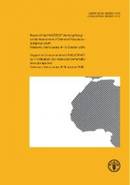Publications
Below are the most recent CECAF publications. Publications are categorized into four types:
Reports |
Technical and extra-ordinary documents |
CECAF/ECAF Series |
Serial publications |
Statutory meetings |
Regular Committee Meetings and Scientific Sub-Committee meetings |
Working group meetings |
Small Pelagic North, Small Pelagic South, Demersal Species North, Demersal Species South and Artisanal Fisheries working groups |
Recent documents
This document is the final report of the eighth session of the Scientific Sub-Committee of the Fishery Committee for the Eastern Central Atlantic (CECAF), which was held in Abidjan, Côte d’Ivoire from 23 to 26 October 2018. The SSC was immediately preceeded by a one-day meeting, on 22 October, on the EAF-Nansen Programme and upcoming survey related activities in the CECAF region. Major topics discussed were: (i) the reports of the assessment Working Groups on small pelagics and demersal species, as presented by the subgroups, and the report of the artisanal fisheries Working Group; (ii) fishery management advice in the CECAF region; (iii) reporting on the state of resources for the CECAF area and considerations for a revised advice framework; (iv) overview and coordination of ongoing research activities; (v) CECAF-FIRMS fisheries inventories; (vi) overview of CECAF statistics; (vii) deep-sea fisheries and vulnerable marine ecosystems; (viii) report of work of other projects/programmes in the CECAF region, report of work of research institutions or scientific groups in CECAF member countries; and (ix) future programme of work in the region.
The fourth meeting of the FAO/CECAF Working Group on the Assessment of Small Pelagic Fish – Subgroup South was held in Elmina, Ghana from 12-20 September 2018. The overall objective of the Working Group is to contribute to the improved management of small pelagic resources in West Africa through the assessment of the state of the stocks and fisheries in order to ensure sustainable use of these resources for the benefit of coastal countries. The Working Group focused on data quality and on the analysis of trends in the basic data (catch, effort, abundance indices and length distribution) and trends in the fishery-independent survey data. The species assessed by the Working Group were: sardinella (Sardinella aurita and Sardinella maderensis), bonga (Ethmalosa fimbriata), anchovy (Engraulis encrasicolus) and horse mackerel (Trachurus trecae and Decapterus rhonchus), and other Carangidae, in the region between the northern border of Guinea-Bissau and the southern border of Angola.
The FAO/CECAF Working Group for artisanal fisheries was created during the fifteenth session of the Fishery Committee for the Eastern Central Atlantic (CECAF) which was held in Abuja, Nigeria, from 1 to 3 November 2000. This document reports on the fifth meeting of Working Group for artisanal fisheries, which was organized in Dakar, Sénégal from 26 to 27 July 2018. The Working Group was held immediately following a three-day regional consultation for West and Central Africa on developing a regional small-scale fisheries action plan for the implementation of the Voluntary Guidelines for Securing Sustainable Small-Scale Fisheries in the Context of Food Security and Poverty Eradication within the African Union policy framework. The overall objective of the Working Group is to improve regional artisanal fisheries knowledge of CECAF Member Countries. The Working Group was organized by FAO headquarters, in close collaboration with the FAO Regional Office for Africa. The Working Group concluded with agreements on issues such as operational modalities, appointment of members and participation in the Working Group, synergies with the CECAF assessment Working Groups, links with other global and regional initiatives, and Working Group financing.
The eighteenth meeting of the FAO Working Group on the Assessment of Small Pelagic Fish off Northwest Africa was held in Banjul, the Gambia, 26 June–01 July 2018. The 26th of June was dedicated to reviewing the outcomes of a two-day meeting to discuss the relevance of 2017 survey data from the R/V Dr Fridtjof Nansen to the Working Group. Mr Erling Kaare Stenevik (IMR, Norway) presented the working document and lead the discussions with the Working Group. From 27 June–1 July, the Group assessed the status of the small pelagic resources in Northwest Africa and made projections on the development of the status of the stocks and on future effort and catch levels. The advice for the stocks is in general given in relation to the agreed target and limit reference points (F0.1, B0.1, FMSY, and BMSY)and on the basis of the projections for the next four or five years.
The fourth meeting of the FAO/CECAF Working Group on the Assessment of Demersal Resources, Subgroup South met in Libreville, Gabon, from 6-15 September 2017. The overall objective of the Group is to contribute to the improvement of the management of demersal resources in Southwest Africa through assessment of the state of the stocks and the fisheries to ensure the best sustainable use of the resources for the benefit of the coastal countries. A total of around 53 stocks were analyzed and when possible assessed by the group. For each of these sections, information is provided on the fisheries, sampling scheme and intensity, biological characteristics, stock identity, trends (catch, effort, biological data and abundance indices), assessment, management recommendations and future research. As for the previous meeting of the Working Group in 2011, trends and quality of the basic data (catch, effort and length frequencies) collected by each country, were one of the main topics of discussion during the 2017 Working Group meeting. The results of the assessments show that some of the stocks analyzed are fully to overexploited, and the Working Group thus recommended that fishing effort should be reduced for the overexploited stocks or not increased for the other stocks, to avoid further decrease. For most of the stocks assessed, the only series of stock abundance indices available were commercial CPUE data series. When possible, recommendations on catch levels are also indicated for each stock. Given that most demersal fisheries in the region are multi specific, an overall reduction in fishing effort is necessary.





